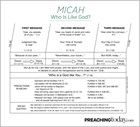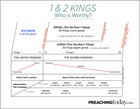Article
Why We Should Preach on Habakkuk

Given the great biblical illiteracy of today’s listeners and the plea for more “practical” preaching, I can understand why some would question the value of preaching Habakkuk. The weight of its historical background can feel heavy, and its mixing of a poetic form with a narrative style within a Minor Prophet can make anyone’s head ache.
Though spending time in Habakkuk may be foreign to some, it is not for those of us who recognize the value of the entirety of the counsel of God. When Paul stood before the Ephesian elders, summarizing his ministry and urging them to follow in his steps, he was clear about his faithful teaching of the whole counsel of God (Acts 20:26). Thus, believing in God’s good provision of the Scriptures, we arrive at Habakkuk. Perhaps it is only by faith that we begin to treat this book as helpful and good for ourselves and for the people of God.
Lack of Preaching from Habakkuk
I likely do not need to convince you that the Book of Habakkuk is rarely the topic of a preaching series. How many times have you sat under the preaching of Habakkuk? I have personally heard two sermons based on verses from its chapters used in my lifetime. While Habakkuk 1:5 is often quoted to urge faith in what God is going to do, the declaration “I am doing a work in your days that you would not believe if told” (Hab. 1:5b ESV) is not a reference to a great revival.
Habakkuk can be challenging to interpret and preach. Though it is poetic prophesy throughout, its forms shift multiple times. The historical context is essential for any grasp of meaning, and explaining the history of the nation, spiritually and politically, at this point is not simple. Ken Fentress puts it this way,
The prophecy of Habakkuk is one of the most challenging and engaging books in the Bible. The issues Habakkuk treats are profound and complex. There are no easy answers to be found in the book of Habakkuk. It demands serious prayer, thoughtful reflection, and persistent reading over and over again to attempt to understand the truths that are contained in this prophecy. Yet, for the Christian who dares to take the challenge, the spiritual rewards can be immense (Redmond, Curtis, and Fentress, Exalting Jesus in Jonah, Micah, Nahum, Habakkuk, Holman Reference, 2016, pg. 210).
Why Even Our Listeners Need Habakkuk
Even in the face of the challenge, the message of Habakkuk is still what people need, just as they need expository preaching from each of the other books of the Bible. Habakkuk brings us face-to-face with injustice, doubt, woe, and attempted hope. In his short book, the prophet teaches us about lament, judgment, and faith.
Lament
Laments acknowledge the very real struggle in our broken world. They reveal anger, doubt, questioning, and fear. The lament that begins Habakkuk does the same. Like other laments, it disrupts the façade of ease and happiness in the godly life and reveals the pain with which each of us wrestle.
Lament also gives us words to bring our despair to God instead of away from him. Specifically, this lament reminds us of our own outcries against injustice and our questioning of what God himself is doing.
In a unique manner, Habakkuk’s lament in Chapter 1 provides a window into the soul of the prophet who disagrees with God’s answer to his lament and the response of God who can handle our disagreement and questioning, while still calling us to faith.
Habakkuk’s prayer gives permission to the church to wrestle and lament. It gives us corporately the boldness to cry out to God and individually to walk in our own questioning and even confusion. We may not understand God’s response, but he has justice in mind. God’s response to Habakkuk is the response we must hear from him from his Word. We are called to live by faith.
Non-Christians need to hear lament preached as they see the broken world before them. Injustice is obvious to them. They need to know that the people of God do not have their heads in the sand when it comes to the brokenness and evil in the world. It is when they will see God’s people lament and walk in a saving faith that they will recognize the hope of our just God.
Judgement
Habakkuk reveals God as just and bringing judgment on his people and on their conquerors (Hab. 2:4, 2:6-20). Wickedness is not ignored by the LORD. He is not blind. The sin of those who take advantage of the powerless in Israel and the transgression of the power-hungry Babylonian subjugators will all be dealt with. Even the ridiculous idolatry is mocked and accompanied by warnings of judgment (Hab. 2:18-19).
The church must remember God’s justice and coming judgment. He sees the injustice and works providentially in history just as he did in biblical times. He does not ignore the wickedness on grand scales nor on small scales, conquering armies or compassionless neighbors. Though we are not privy to the details of all his judgment today, final judgement is coming. He will bring his glory before the entire earth, and they will stand in awe of him. So even now, as the church recognizes the sin in the world and is convicted of their own worthy judgment, they must bow before him, relying on his grace.
Those who are outside the people of God must hear judgment preached on the wickedness around them and within them. The woes of Habakkuk spoken for not only the evil conquerors but also the wicked within Israel call all to recognize the just judgment coming for them. Their only hope is the grace of God and surviving by faith in this gracious God.
Faith
The call to faith in Habakkuk is central. It is the LORD’s response to Habakkuk from his complaint, and it is Habakkuk’s final response to the LORD in Chapter 3. The statement that “the righteous shall live by his faith” echoes through the New Testament and grounds our teaching regarding saving faith.
In the context of Habakkuk, faith is contrasted with the proud destroyers (Hab. 2:4). It is the way of life, even though tragedy and chaos are on the horizon. The response of the prophet in Chapter 3 is to recall the works of the LORD and proclaim his faith, but this is not a stoic mouthing of what was instructed. The terrified prophet gives us a glimpse of faith in utter suffering. It helps us understand hope when additional disaster is on its way.
This way of faith is not esoteric. It is gritty and real, and it is what the church needs to comprehend. Living by faith includes facing hardship with fists clinging to hope we do not yet see. As Habakkuk trusted in the LORD who would ultimately save and bring hope, so do we. The church needs to see the way of faith expressed by Habakkuk, and she needs to know that the hope of Habakkuk is also our hope. Walter Kaiser says about preaching the Prophets that “To preach these words faithfully is to unleash for God’s people direction, comfort, and a hope that surpasses every other expectation that mortals could ever imagine or aspire to on planet earth!” (Kaiser, Preaching and Teaching from the Old Testament, pg. 119).
Those who are yet to place their faith in Christ need to hear Habakkuk preached and see the call to faith, for judgment is coming for them just as it was coming for Israel and for the Babylonians. Though heartbreak and suffering in this life may come, Habakkuk reveals the true economy; what God offers is better than anything else he might lose (Hab. 3:17-19).
Preaching a Series on Habakkuk
So how do you plan to preach Habakkuk? Let me suggest one option of preaching divisions and some sermon big ideas to get you thinking.
Dividing the text into three preaching segments along the natural textual transitions at Habakkuk 2:6 and Habakkuk 3:1 is wise, noticing the texts transitional introduction to the taunt song in 2:6 and the introduction of the liturgical prayer in 3:1 (For more on the transition in Hab. 2:6 see Paul Redditt, Introduction to the Prophets, pg. 295). This leaves us with three preaching passages of Hab. 1:1-2:5, Hab. 2:6-20, and Hab. 3:1-19.
Beginning with Habakkuk 1:1-2:5 allows us to preach the entire conversation between the prophet and the Lord, not stopping before final answer the Lord provides—the revelation of the central vision of the book in Hab. 2:4. Thus, the question of the text is how to wait for justice in a broken and corrupt world, and the main point of our exposition could be worded “Our answer is faith in a just, faithful God.” This main point is accurate from the text within its historical context, and as preachers living in the New Covenant, we can proclaim it with its implications of the work of Christ and his faithfulness revealed to us. The textual goal was to give hope and comfort to a fearful people while calling them to faith. That was the intention of the prophet in writing his first section, and this goal should be ours as well.
The second text is a series of woes on the idolatrous abusers of others, in this case likely pointed at the Babylonians but hinting at a more general condemnation. Following the forcefulness of the text, we could contextually explain the abuses of others and then phrase the thrust as, “Do not forget that the LORD will bring just judgment.” This is in line with the goal of the text to both comfort the righteous and call the sinner to respond. As preachers in the New Covenant, this is still a true statement about judgment to be preached today, but in our context, we must trace the biblical theological theme of judgement to our place on this side of the Cross, where judgement is still real and coming. Yet, there is hope because it has also fallen on the Son of God for those who live by faith.
The final chapter reveals a prayer of the prophet. Filled with vague pleas, a dramatic theophany, gut-wrenching emotion, and a heart-felt statement of trust, this prayer can feel like a rollercoaster. Still, Habakkuk is leading the remnant in the obedient application of the central vision of Habakkuk 2:4. The prophet is teaching the people how to live by faith. “Because of God’s power and salvation, we can trust him in great loss,” the prophet is saying. I have phrased the main point as “The LORD is trustworthy in turmoil.” While waiting in that turmoil, Habakkuk mentions hope in “the anointed,” who is the kingdom’s hope of a deliverer king (Hab. 3:13). That descending line would bring us to the Anointed one, in whom we hope today even in turmoil.
Preach the Hope of Christ from Habakkuk
When we preach Habakkuk, we must admit that the world is broken. It was in his day, and it still is in ours. Evil and injustice permeate places of power if we’re paying attention. At the same time, God is real. He is just. He is working, and he is merciful. So, Habakkuk teaches us lament. Habakkuk reminds us of the truth of just judgment. Finally, Habakkuk lays the path of living by faith. The God who met Habakkuk in the midst of his lament against injustice is the same God who met us at the Cross to deal with injustice. This is the God our audience still knows and serves today.
Taylor Turkington (DMin) directs BibleEquipping which trains women to study and teach the Bible. She’s the author of Trembling Faith: How a Distressed Prophet Helps Us Trust God in a Chaotic World.










